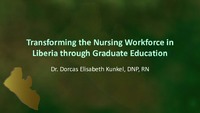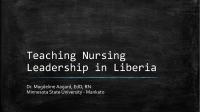Transforming the nursing workforce through leadership growth
View File(s)
Visitor Statistics
Visits vs Downloads
Visitors - World Map
Top Visiting Countries
| Country | Visits |
|---|
Top Visiting Cities
| City | Visits |
|---|
Visits (last 6 months)
Downloads (last 6 months)
Popular Works for Aagard, Magdeline C. by View
| Title | Page Views |
|---|
Popular Works for Aagard, Magdeline C. by Download
| Title | Downloads |
|---|
View Citations
Citations
Session presented on Monday, November 9, 2015:
Leadership is considered a critical attribute in the enhancement and transformation of the nursing workforce of Liberia. As part of this leadership transformation, the Master's of Science in Nursing Education (MSN) program was created and delivered at the Mother Patern College of Health Sciences in Monrovia, Liberia. The program was designed to create leaders through higher education in nursing, as well as specific leadership curricula, followed by practica and mentoring at the student's home Liberian nursing educational institution. Looking to develop a culturally contextual leadership curriculum for the MSN program, the author looked to the literature and her experience in designing other culturally contextual and leadership curricula. Beginning with international leadership literature, surprisingly, there is a dearth of literature on the topic of international nursing leadership. What comes up in literature searches in CINHAL and PROQUEST are studies looking at what we in the United States are teaching about international leadership, but little on what nursing leadership means in other cultural contexts. Literature on leadership capacity building is focused on high income countries, rather than low-income, low resource countries (Curry, Taylor, Chen, Bradley, 2012). Programs aimed at developing leadership skills for nurses from and health professionals from low and middle income countries are limited (Wilson, Crooks, Day, Dawson, Gakumo, Harper, Jones, McCarty, Theus, 2013). What was available was information from influential leaders such as the past president of STTI, Dr. Mansour Jumaa. In his 2007-2009 Address he noted that there are four key themes to international leadership, "being intentionally global, building knowledge resources, developing further leadership skills and creating greater emphasis on providing services." Another source of leadership themes came from the work of Curry, Taylor, Chen and Bradley (2012) who interviewed 17 health care leaders from four sub-Saharan African countries, including Liberia. The five themes they found were: having a value-based vision for improving the health of the country, being self-aware and having the ability to identify complementary skills in others, tending to relationships, using data to make decisions and a sustained commitment to learning. Incorporating these themes was important as part of the cultural context of leadership in Liberia. As a nurse who has worked extensively internationally and created other contextually relevant curricula, the author sought other means to understand culturally relevant information to develop the leadership context. Talking with American Liberian nurses and reading books about Liberia gave information and insight in the role of nursing as a profession within the health care system in Liberia. It also gave context to gender roles in Liberia and the patriarchal societal structure, both of which impact the context of leadership. Another contextual component was the way in which decisions are made regarding who is placed in presumed positions of power and influence. These are sensitive social constructs and cultural mores that are long standing. Bringing them to light as topics of discussion in the context of leadership was challenging, especially for someone who was not of the culture. However, it was important for the leadership growth of the nurses in the MSN program who would be living with and be challenged by these very issues. Three cohorts have graduated from the program. Some graduates have chosen to stay in their role as nurse educators, or deans of their respective schools of nursing. Others have moved into positions of increased leadership and responsibility because they have obtained their MSN. The unfortunate outbreak of Ebola led to the creation of new leadership positions and positions in education and training that opened up new job opportunities for our graduates. One of the themes of leadership is the desire for lifelong learning. Several of our graduates are looking to pursue their doctoral degree through online universities because Liberia doesn't have any doctoral programs. We are working hard to help them realize their dreams.
43rd Biennial Convention 2015 Theme: Serve Locally, Transform Regionally, Lead Globally.
Items submitted to a conference/event were evaluated/peer-reviewed at the time of abstract submission to the event. No other peer-review was provided prior to submission to the Henderson Repository, unless otherwise noted.
| Type | Presentation |
| Acquisition | Proxy-submission |
| Review Type | Abstract Review Only: Reviewed by Event Host |
| Format | Text-based Document |
| Evidence Level | N/A |
| Research Approach | N/A |
| Keywords | Liberia; Nursing; Ebola |
| Name | 43rd Biennial Convention |
| Host | Sigma Theta Tau International |
| Location | Las Vegas, Nevada, USA |
| Date | 2015 |
All rights reserved by the author(s) and/or publisher(s) listed in this item record unless relinquished in whole or part by a rights notation or a Creative Commons License present in this item record.
All permission requests should be directed accordingly and not to the Sigma Repository.
All submitting authors or publishers have affirmed that when using material in their work where they do not own copyright, they have obtained permission of the copyright holder prior to submission and the rights holder has been acknowledged as necessary.
Related items
Showing items related by title, author, creator and subjects.
-
Teaching nursing leadership in Liberia
Aagard, Magdeline C. (2016-03-21)Session presented on Tuesday, November 10, 2015: Teaching nursing in a global context necessitates an understanding of the material being taught, as well as an understanding of the cultural context. Liberia's civil war ... -
Exploring nurse managers' views about the practice of compassion in the US
Aagard, Magdeline C.Nurse leaders from the U.S. were surveyed regarding compassion. Data were analyzed for themes through content analysis revealing compassion is showing empathy, care and concern; create opportunities to listen to and interact ... -
Transforming the nursing workforce in Liberia through graduate education
Kunkel, Dorcas Elisabeth (2016-03-21)Session presented on Monday, November 9, 2015: Nursing education in Liberia, West Africa has been slowly recovering from the destruction of health care education institutions that was experienced during the horrific civil ... -
Member growth and development: Promoting transformational leadership through a new member scholarship program
Loyd, Lauren A.This Sigma chapter developed and implemented an ongoing New Membership Scholarship Program. Through this program, scholarship recipients are mentored within their professional roles to both the chapter and nursing. This ... -
Experiences in nursing, nursing education and leadership in Liberia before Ebola and beyond
Mondaye, Harriette N. S.; Beyan, Edwin; Beyan, Edwin (2016-03-21)Session presented on Monday, November 9, 2015: Nursing experiences in Liberia have been fraught with challenges because of the lack of infrastructure made worse by the civil war. Edwin's first years as a nurse at the John ...





